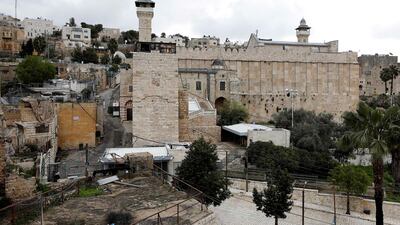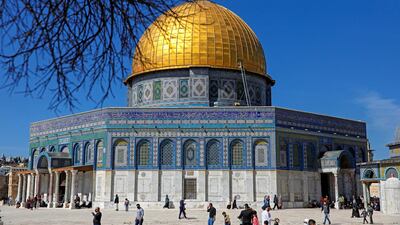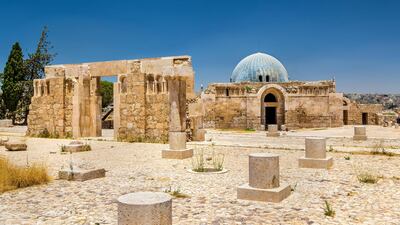Every year before Ramadan begins, Muslims work to adjust their daily routine, preparing to fit in taraweeh prayers, performed every night throughout the holy month.
Usually, these special Ramadan prayers, which last more than an hour, are performed in congregation, but with mosques either closed or operating at limited capacity this year because of Covid-19, many Muslims will perform them at home.
Other Ramadan prayer rituals will also be curtailed this year, with many countries banning i’tikaf – in which worshippers seclude themselves in the mosque for the last 10 days of the holy month.
With more than a billion Muslims planning to observe the holy month around the world, governments are establishing rules and procedures to combat the spread of the Covid-19 pandemic.
Here is a country-by-country guide to the regulations around prayers across the Mena region, where mosques are open, and which are operating at full or part-capacity.
Al Aqsa
Because of the sensitivities attached to Al Aqsa mosque compound, which is in occupied East Jerusalem, Ramadan plans are subject to discussions involving Israeli authorities and the Waqf authority, which administers the site.
On March 31, the Waqf called on Muslims to get vaccinated against coronavirus before Ramadan. It also urged worshippers to abide by rules, such as wearing face masks and maintaining distance between one another during prayers.
Israeli authorities usually ease border restrictions during Ramadan to allow a greater number of Palestinians to visit Al Aqsa from the West Bank.
Cogat, the Israeli military wing responsible for civilian affairs in the West Bank, is yet to announce measures for the holy month.
Algeria
Mosques will be open for the five daily prayers as well as Friday prayers and taraweeh prayers, provided they do not exceed 30 minutes, according to a statement by the Ministry of Religious Affairs and Endowments.
The current curfew imposed on nine of the country’s 58 provinces will continue between 11pm and 4am during Ramadan.
Bahrain
Those who had their second covid-19 vaccine more than 14 days ago and those who have recovered from the virus will be allowed to visit their local mosque for Friday and taraweeh prayers.
They must show a vaccination certificate or proof of recovery on the Be Aware app.
Sermons are limited to 10 minutes, and mosques are allowed to open for 45 minutes before the service and 20 minutes after.
Egypt
Unlike last year, Egypt's Muslims can pray at mosques this Ramadan, including taraweeh, provided precautionary measures such as social distancing and wearing face masks are observed. Mosques will be open only 10 minutes before each prayer and close immediately after.
Muslims will not be allowed practice i’tikaf, in which they stay at the mosque for several days.
Washrooms at mosques, where ritual cleansing before prayers is performed, will be closed during the holy month, according to the Ministry of Awqaf, or religious endowments. Worshippers should also bring their own prayer rugs, it said.
Iraq
The country's director of public health, Riyad Abdul Amir, said the health ministry has no "intention to take new measures during the blessed month of Ramadan", and will allow the five daily prayers, including taraweeh, to continue in mosques.
Israel
In late March, the Israeli health ministry said prayers during Ramadan can take place in mosques with up to 20 worshippers inside, 50 outside, or a maximum of 50 people if a mosque includes both.
Jordan
Mosques will remain open during Ramadan this year as long as social distancing rules are observed
The exception is on Fridays, when an all-day curfew will be in place, meaning Friday prayers will not be conducted communally.
Worshippers will be allowed to leave their homes on foot for half an hour to attend sunset and dawn prayers. Isha and taraweeh prayers will not be allowed in mosques.
The rules will remain in place for the duration of the holy month, with no changes expected during the last 10 days.
Kuwait
The partial curfew continues during Ramadan, between 7pm and 5am,.
According to a statement by the Minister of Endowments and Islamic Affairs Issa Al Kandari, people are allowed to walk to the nearest mosque to attend taraweeh and qiyam al layl prayers. Women's prayer halls will be closed, in an effort to control the spread of the virus by keeping children, who usually accompany their mothers to night prayers, at home.
Lebanon
Mosques will be allowed to open for prayers but only at 30 per cent capacity.
Libya
The government has yet to confirm whether mosques will be open for prayers and whether or not taraweeh will be allowed at mosques.
Morocco
On Wednesday, the Moroccan government announced a night curfew from 8pm to 6am, indicating that citizens will have to perform taraweeh payers at home during Ramadan 2021. The government has yet to confirm whether or not taraweeh will be allowed at mosques.
Oman
Mosques will be open each day until the maghreb prayers at sunset, but the big Friday prayers will not be allowed in mosques.
This year, there will be no taraweeh prayers and mosques will not hold iftar meals.
Qatar
Qatar announced the reimposition of strict lockdown measures on April 7, banning most indoor activities except retail and work in an effort to contain surging coronavirus case numbers.
Mosques will be open at set times for the five daily prayers, but authorities have ordered that Ramadan's additional prayers be conducted at home.
Saudi Arabia
Mosques across the kingdom that follow Covid-19 safety procedures and health protocols will be allowed to remain open over the holy month, Saudi authorities said.
Worshippers are asked to maintain social distancing and wear masks, but people will not be able to perform i’tikaf.
Friday sermons have been cut down to 10 minutes and worshippers must bring their own prayer mat and Quran, remaining physically distant from others.
Taraweeh prayers have been shortened from 20 rakaat (salutations) to 10, limiting the Ramadan prayers to 30 minutes, in addition to maintaining restrictions on the number of worshippers in the holy mosques in Makkah and Madinah.
The mataf (area for circumambulation around the Kaaba) will be reserved for Umrah pilgrims only and there will be five designated areas inside the Grand Mosque and its eastern courtyard for the performance of prayers.
Only those with a valid permit for performing Umrah or prayer at the Grand Mosque will be allowed to enter Makkah.
According to the new Ramadan plan set by the General Presidency for the Affairs of the Prophet’s Mosque in Madinah, children under the age of 15 will not be allowed to enter the historic mosque or its courtyards during Ramadan.
Sudan
The government has yet to confirm whether mosques will be open for prayers and whether or not taraweeh will be allowed at mosques.
The West Bank
Mosques will be open for daily prayer, though Friday prayers will be held outdoors. A general lockdown will be imposed on Fridays, when only bakeries and pharmacies will be allowed to open.
Tunisia
Mosques are open, with no limit on capacity for worshippers, although there is a 7pm to 5am curfew in effect.
Turkey
The president of Turkey’s Religious Affairs Directorate Ali Erbaş said taraweeh prayers will be performed "in homes rather than in mosques” because of the pandemic.
Full weekend lockdowns will be imposed during Ramadan in cities with the highest coronavirus rates and a curfew implemented between 9pm and 5am across the country will continue.
UAE
Mosques will be open during the holy month but must be sanitised before and after prayers.
Taraweeh prayers will be conducted under the safety measures already announced, including capacity limits and mandatory wearing of masks.
The duration of isha and taraweeh prayers in mosques is capped at 30 minutes. Isha prayers will be held five minutes after the call to prayer.
Worshippers must also take their own prayer mats and copies of the Quran, and follow social-distancing protocols.
Dubai Islamic Affairs and Charitable Activities Department said that mosques will be open from the time of azan, the call to prayer, until the end of obligatory prayer and will close immediately after that.
The department asked mosques to enforce strict safety measures.






































